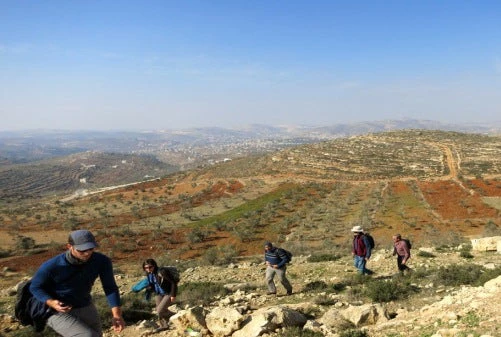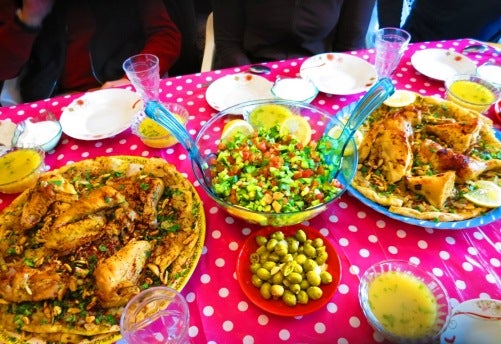 Among the olive groves, almond blossoms, lush grass, and views of small towns nestled on hilltops and in valleys, World Bank colleagues and I hiked a trail in northern Palestine. Ducking into cool, dark, ancient aqueducts used by civilizations centuries ago, we paused for tea brewed by our local guide in a kettle over an open flame. A homemade meal by a local family topped off our trek.
Among the olive groves, almond blossoms, lush grass, and views of small towns nestled on hilltops and in valleys, World Bank colleagues and I hiked a trail in northern Palestine. Ducking into cool, dark, ancient aqueducts used by civilizations centuries ago, we paused for tea brewed by our local guide in a kettle over an open flame. A homemade meal by a local family topped off our trek.
Clearly, this is not a typical hiking trail. It is also not a typical World Bank approach to development.
Abraham Path, or Masar Ibrahim in Arabic, is a cross-cultural, long-distance tourism route running roughly along the path once walked by Abraham, or Ibrahim, the father of Judaism, Christianity and Islam. More than 400 km long, it connects 40 communities across four countries. The path links cultures, communities, and generations across history, a reminder of our common origins and common humanity.
More than 4,000 people have hiked it since 2008, most in Palestine and Jordan. Walkers enjoy homestays and homemade meals with local families, and local guides provide navigation and share their knowledge of history and culture. Both put money into the local economy in a different way than day trips to Bethlehem, which make up the majority of existing tourism in Palestine.
We experienced the path firsthand, guided by the Abraham Path Initiative, a non-governmental organization working to uncover Abraham’s footsteps from his birthplace to his burial site. Our group shared an afternoon together walking along the trail taking in the impressive views. As the call to prayer echoed among the hilltops, we felt in awe of the area’s historical and religious significance. What would have been already beautiful on its own was brought to life by the historical, anthropological, and cultural knowledge shared along the way by our friendly local guide.
The Abraham Path may eventually cross nearly 5,000 km and ten countries in the Middle East. The Palestinian segment passes through 13 communities in the West Bank, starting with Nablus in the north and ending with Hebron in the south. The route goes well beyond the traditional hubs for tourism, diversifying what tourism offers in the West Bank and Gaza.
The path has great potential to make a positive impact on rural communities in the West Bank, particularly for women and for youth for whom unemployment rates are amongst the highest in the region. This sort of experiential and cultural tourism is an innovative way to reach groups in rural areas due to the variety of jobs across skill levels and locations.
Women are the key hosts along the Abraham Path, managing and preparing lodging and food without necessarily having to leave their homes. Local organizations help boost the sale of local women’s handicrafts. In the Middle East and North Africa region, where women still often stay at home, this helps empower them, generates income for their families, and maintains the tradition of hospitality.
More investment is needed in the guides, communities, and NGOs who support the path. This is where the World Bank comes in. Viewing it as an innovative way to reach people marginalized in rural communities, the World Bank is investing in the development of the path itself, its capacity and sustainability, and its marketing through a virtual information hub, location-based mapping, and social media.
Women and youth will benefit from tourism and language training and work readiness programs. This support is expected to generate jobs and increase incomes for the people and communities located along the path, particularly for women. More broadly, the World Bank believes that tourism—particularly non-traditional tourism such as Abraham Path—holds significant potential for generating income and jobs across the Middle East.
 Not only did our team walk the path, but we also had a glimpse into the life of a local family, their challenges, triumphs, and hopes. At the end of the hike, we were hosted for lunch by a couple and their two sons who treated us to a delicious meal of
musakhan—the Palestinian specialty of roasted chicken baked with onions, sumac, allspice, olive oil, and pine nuts, served over layers of
taboon, a thick and bubbly flatbread. The tangy lemon flavor of saffron blended perfectly with the sweetness of the caramelized onions and spice-baked chicken.
Not only did our team walk the path, but we also had a glimpse into the life of a local family, their challenges, triumphs, and hopes. At the end of the hike, we were hosted for lunch by a couple and their two sons who treated us to a delicious meal of
musakhan—the Palestinian specialty of roasted chicken baked with onions, sumac, allspice, olive oil, and pine nuts, served over layers of
taboon, a thick and bubbly flatbread. The tangy lemon flavor of saffron blended perfectly with the sweetness of the caramelized onions and spice-baked chicken.
Afterwards, we had tea and learned more about the family’s daily lives and their hopes for prosperity and peace in the region. They told us of their involvement in the local community, including the woman’s work with a local women’s organization.
Visiting this family exemplified what makes the Abraham Path meaningful – a chance to connect with people at a deeper level, their kindness capturing the memory of Abraham and his generosity and his hospitality to strangers.
The World Bank would like to acknowledge the generous support of the State and Peacebuilding Fund (SPF), which is fully financing this project. The multi-donor State and Peacebuilding Fund (SPF) administered by the World Bank has been the institution’s primary vehicle for supporting state and local governance peace-building efforts in fragile and conflict-affected regions since 2008. The SPF aims to scale-up international engagement in fragile and conflict-affected countries, promote cross-cutting, innovative approaches, and foster strategic partnerships.


Join the Conversation